David Dorward, Botanical Services Team Leader for the City of Edinburgh Council
If anyone understands the seasonal beats of West Princes Street Gardens, it’s David. He knows winter when frost clings to the lower sections of the gardens. He knows spring when daffodils burst onto banks, and buds and blossom unfurl in the weak sun. He knows summer when the grass is growing and the weeds are growing and people fill the gardens to lie out in the sun. He knows autumn with its fallen leaves and sweeping up and pruning back and taking out the succulents before the frost returns.
Spring and early summer are his favourite times. ‘Driving in the gardens in the morning with the sun rising in the east and casting rays through the trees and there’s no one else in the place, it just feels quite special.’ He has an affinity with the gardens, a tranquil peaceful space which at times feels like his own back garden.
He has worked in the gardens for thirty-six years, starting out as an apprentice and gaining a qualification in amenity horticulture, learning his trade in the nurseries around Edinburgh, getting a shot on the famous floral clock – the clock that would later become his pride and joy and win him a gold medal at the Chelsea Flower Show and numerous comments and congratulations from passersby. He is now team leader with responsibility for managing the gardens’ changing seasons, to oversee the planting out, the deadheading, the rose pruning, the mowing, the edging, the litter picking, the path sweeping. He’s got an eye on the horizon too. A desire to plant and plan for two, three, four years’ time, to protect against decay and disease, to innovate, to improve, to continue to dazzle.
If he has a favourite spot, it’s the floral clock up by the east entrance to the gardens, that he plants with loving care, lying horizontally on a ladder to avoid crushing the plants, early each May. Last year the clock’s design was a poppy to commemorate one hundred years of the end of the First World War. Next year’s plants are incubating in the city’s hothouses, the design not yet revealed.
He loves the interaction with the public and all their wild and varied questions. How many plants in the floral clock: thirty-five to forty thousand. What species of tree is this: a Wheatly Elm. Where are the toilets: at the West end of the gardens. Where’s the castle: where’s the castle??And he’s happy to watch the commuters take the scenic route through the gardens of a morning as the city is wakening up.
To David, the gardens are a tranquil place, a place of horticultural excellence, a space in which tourists, city workers and families can relax amongst the sycamores, weeping ashes, Elms and ginkgos. Where they can enjoy beds of meticulously planted violas and non stop begonias, where, away from the noise of Princes Street, they can hear birdsong. There are challenges to keeping this idyll. The frost for one could rot the roots of the plants in the floral clock so the weather needs to be watched carefully and the planting out timed impeccably. The slopes are a challenge to mow because their gradients are steep. The remote control mowers help: changed days from thirty-six years ago when gardeners were using scythes to cut the grass. Now he’s trialling robotic mowers on the lawns which can be programmed to mow overnight or during the rain, freeing up gardeners – because there are half the number of gardeners than there were when he started – to do the planting and the pruning.
And there’s the events too: the Hogmanays, the concerts, the festivals, the trucks and cables and infrastructure, the cordoning off. How to keep the gardens open to the public, how to carry on with the gardening work, how to keep everyone safe, and above all, how to return the gardens to their tranquil state. ‘That’s what I’m looking for. That’s my goal. I want to make it so if an event comes in they go away again and you’d almost not know they’d been there.’
Last year a creature challenged him for days. Something was pulling up the young bedding plants of the floral clock. Every morning David would find them scattered on the earth. It wasn’t a squirrel because it wasn’t burrowing like a squirrel, it wasn’t a rat because pest control put down bait and the bait wasn’t taken. Yet still the plants were uprooted. Finally, a park ranger closing the gardens at dusk spotted a lone blackbird ripping the young plants from the earth with a raffish shake of its head. The bird then picked out the grubs and bugs and worms in the exposed earth to take to its nest and feed to its young. With regret for the blackbird’s young, David placed a net over the floral clock’s young plants. The blackbird foraged elsewhere. For another year the clock flourished.
Surely David must have always wanted to be a gardener, being a man with such an affinity with plants and nature, who admits to getting lost in the moment when planting out, forgetting time, having to tell himself to stop for the day. My dream was to be a train driver.’
As a child, David came with his sister to the Ross Theatre, walking along paths and flower beds he would one day tend, never imagining that he would one day name every flower, every shrub, every tree that covered every inch of the place. He came with his sister to sit and watch the shows – Punch and Judy or Children’s Hour – only to wander away partway through and stand on the bridge that over looked the railway lines and watch the trains going in and out of Waverley. ‘But in those days you had to have perfect eyesight and I wore glasses so my dream was dashed.’
David’s phone is set to sound a train’s whistle whenever a new text arrives, and that’s often because his work is busy. Trains pass along the northern edge of the gardens from when he arrives at seven forty-five to when he leaves at dusk and those reminders of trains are good enough for him, because this gardener who has travelled to Japan and Germany through his work, who has won gold medals at Chelsea, who thrives on the conversations he has with locals, with tourists, with enthusiasts from around the world, wouldn’t want to work anywhere else.
‘I’ve been a lucky lad, really. It’s been quite good to me. From being an Edinburgh lad and coming here as a kid, playing and seeing shows, and coming to the floral clock with my mum and dad, to be actually working here. I’m a happy lad.’
Interview transcript by Alison Irvine – February 2019
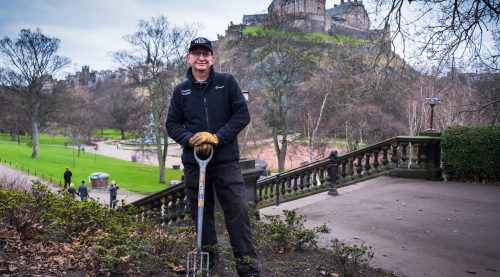
West Princes Street Gardens' Head Gardener, David, talks about his passion for gardening - including the floral clock of course - and reflecting on how West Princes Street Gardens have changed over the years.
Read David’s Story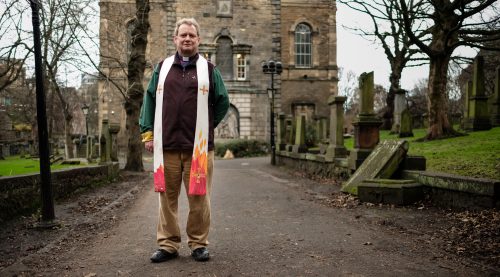
Reverend Peter Sutton describes St Cuthbert Parish Church's history and his own connection to West Princes Street Gardens
Read Reverend Sutton’s Story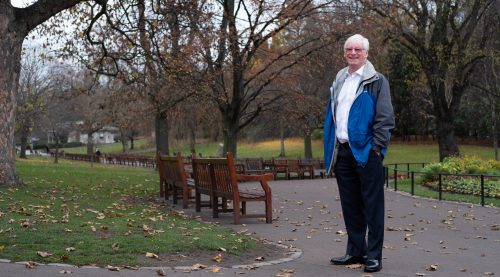
Our Chairman, Norman Springford, talks about his memories of visiting the gardens as a young boy and his pride in leading their reimagination.
Read Norman’s Story
Join the Dooks Family on their visit to West Princes Street Gardens.
Read The Dooks’ Family Story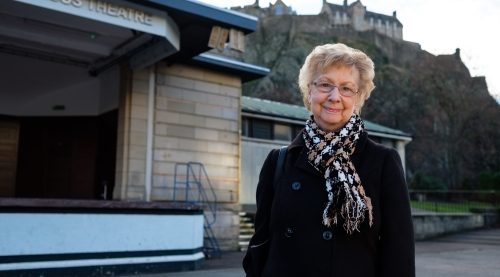
Moira Hepburn (or Auntie Moira) recalls fond summer days playing the piano at the Ross Theatre for Children's Hour.
Read Moira’s Story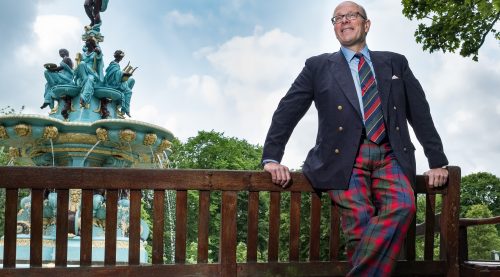
David Allfrey, Producer and Chief Executive of The Royal Edinburgh Military Tattoo talks about his enthusiasm for The Quaich Project and shares his favourite space within West Princes Street Gardens.
Read David Allfrey’s StorySign up to our newsletter and be kept up to date with the development progress of The Quaich Project.
If at any point you wish to be removed from our mailing list, simply click ‘Unsubscribe’ at the bottom of any of our e-newsletters or email [email protected].
You can read our privacy policy here